Charlie Tagawa
| Charlie Tagawa | |
|---|---|
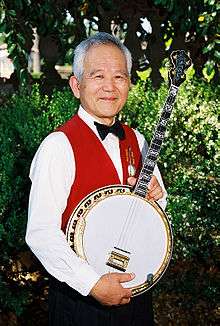 Charlie Tagawa, music director of the Peninsula Banjo Band | |
| Background information | |
| Birth name | Zenzo Tagawa |
| Born |
27 October 1935 Tokyo, Japan |
| Died | 30 July 2017 (aged 81) |
| Genres | Dixieland, ragtime |
| Occupation(s) | Musician |
| Instruments | Banjo |
| Years active | 1956–2017 |
| Website |
www |
Charlie Tagawa (October 27, 1935 - July 30, 2017 ) was a Japanese-American musical entertainer, banjoist, and Japanese immigrant. His musical career has spanned seven decades and as a critically acclaimed performer he was regarded as one of the best contemporary banjo players and arguably one of the all-time best.[1] He performed regularly across the U.S. and in Japan where he was known professionally as Japan's 'Harry Reser'. A 2003 inductee into the National Four-String Banjo Hall of Fame,[2] Tagawa often performed as the headline act at banjo jazz festivals and shows. He was also the international good will ambassador for the Peninsula Banjo Band.
Tagawa was once a protege of the great tenor banjoist, Harry Reser, who advised and encouraged Tagawa in his quest for perfection in single string technique. Out of respect and admiration for Reser, Tagawa will on occasion perform one of Reser's original compositions such as "The Cat and the Dog", "Cracker Jack", or "Lolly Pops".
Early career
Born in Tokyo, Japan, Tagawa was introduced to the banjo when he was twenty-one by one of Japan's top banjoists and recording artists, Takashi Tsunoda, in 1956.[3] Although he started on guitar, he found his calling after picking up a four-string tenor banjo. Shortly thereafter Tagawa purchased a used tenor banjo for $20.00. After graduating from Senshu University with a degree in Economics, he became a student of Tsunoda's. Tagawa was an apt student and quickly developed a style and manner of his own.[4] After three months of lessons and practicing Tagawa became a professional banjo player and started earning money from his performances.[5]
Tagawa joined a country-western band in Tokyo, playing lead banjo on a two-year tour.[5] He then joined the Dixieland Dukes as a soloist for three years. Tokyo's Gaslight Club was his next stop as a featured entertainer as his repertoire began to include favorite songs of other nations.
Performing at restaurants
In 1964, the owner of the Sakura Gardens restaurant in Mountain View, California, was in Tokyo for the summer Olympics[6] and caught Tagawa's act. He was so impressed by Tagawa's extraordinary skill with a tenor banjo and versatility that he offered him a contract to play at his restaurant in the U.S. This break for Tagawa was also a great break for the jazz enthusiasts of northern California. After reaching the United States, Zenzo Tagawa was rapidly Americanized to Charlie Tagawa and soon after he was discovered by numerous restaurant patrons as well as other banjo players in the area. Tagawa performed at Sakura Gardens, and its successor restaurant Imperial Gardens, for a total of fifteen years.
He developed a loyal following of fans. On many evenings, one or another of his banjo or Washtub bass ("gut bucket") playing friends would drop in to listen or to jam. He often augmented his experience and repertoire by playing with local musicians. This also included performances at other venues one of which a stint at San Francisco's Red Garter beer palace and night club that provided continuous entertainment. The Red Garter clubs were hotbeds of banjoists.[7][8][9]
Cupertino Banjo Band
It was in 1966 that Tagawa was asked to join a local band. He met Chuck Ray, a banjo teacher and the leader of the Cupertino Banjo Band. His interest in the banjo was fueled in part by his frequent performances at a Shakey's Pizza Parlor. The Shakey's Pizza chain was known for its longtime use of banjo music in its restaurants. Sherwood "Shakey" Johnson played Dixieland jazz piano to entertain patrons. Started in Sacramento, California, Shakey's Pizza became known outside Sacramento not for its pizza but for the jazz program it sponsored on a regional radio network. Shakey's used banjo players performing Dixieland and ragtime classics, plus hits of the early 1900s, '20s, and '30s, similar to the format of Jack Dupen's Red Garter club in San Francisco which spurred demand for banjo players.[7] Many others, thrilled by the music, sought out banjo teachers to learn to play.
With Tagawa's leadership and reputation, the Cupertino Banjo Band grew at a steady pace and the band's name was changed to the Golden Gate Banjo Band. In 1971, the group voted to be known as the Peninsula Banjo Band to acknowledge that members came from as far south as Santa Cruz and Burlingame to the north on the San Francisco Peninsula.
Tagawa taught several hundred students, many of whom have gone onto successful musical careers.[5] These musicians include Bill Lowrey, Kevin McCabe, and Scotty Plummer.
Tagawa has been music director of the Peninsula Banjo Band for all but one year since 1966. He uses a modified form of the Suzuki method to teach students.
Junior Banjo Band
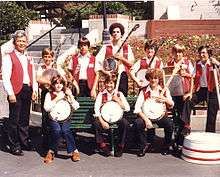
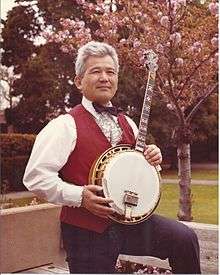
In the early 70's several of Tagawa's students formed a band to extend their skills with the banjo. The members ranged in age from six to sixteen and included banjo, guitar, piano, and washtub basses. Tagawa led the band through the mid-1980s.[5] The band was eventually asked to perform in public, at which time they chose to go by the name Charlie Tagawa's Junior Banjo Band.[10]
The band performed on television shows and at venues such as Marriott's Great America amusement park, county fairs, and at charitable organizations' functions and clubs. In 1975, the band played at the Fretted Instrument Guild of America annual convention in Atlanta, Georgia. Their greatest performance was at a Banjo Jubilee festival in Tokyo.[11] The band performed in public from 1972 until its last performance at the annual Banjo Jubilee jazz festival in 1985.
The band's only album was The Stars & Stripes Are Forever (1977). Several members became professional musicians, such as Bill Lowrey, Kevin McCabe, Scott Hartford, Bruce Jolly, Pat Dutrow, and Nori Tagawa.[10]
Peninsula Banjo Band
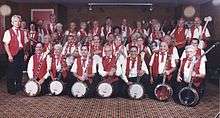
Starting in 1975, the Peninsula Banjo Band has recorded and produced four collections of performances along with numerous "special edition" recordings distributed to band members only and not-for-sale to the public. Just Because, was released on LP. More! More! More! (1981) was released on both LP record and audio cassette. Just One More Time (1996) was released on tape and the then new digital format, compact disc. That Charlie Sound (2008) is the band's most involved effort thus far. The CD includes fifteen tracks by the band and features Tagawa with a small combo that includes his sons Nori and Leon along with Bill Lowrey.
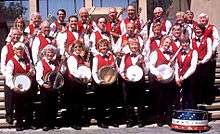
Awards and honors
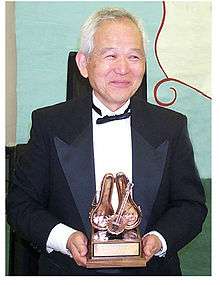
In 1967, he was elected Best Banjo Player of the Yearby the New Orleans Jazz Club of Northern California. George Barnes, writing in England's BMG magazine, said that Tagawa is one of that rare breed who is dedicated to play and teach the banjo as it should be played. Tagawa said, "Playing the banjo is my life—I love it."[12]
In 1978, Tagawa's reputation earned him an invitation to perform with a group of musicians from Japan. Yoshio Toyama's Dixieland Saints performed in concert at Stanford University. The session also generated a recording released on LP, Live "Stanford University", in May of that year.[13]
He was a two-time winner of FRETS magazine's Reader's Poll for "Best Banjoist - Tenor or Plectrum - All Styles" in 1982 and 1983.
In September 2001 during the annual Banjo Jubilee jazz festival Tagawa was awarded the Lifetime Achievement Award by Banjos Unlimited, a nonprofit association dedicated to the preservation of the banjo and its music. Tagawa was further acknowledged as the 2001 Jubilee Honoree for his contributions to the Peninsula Banjo Band.
In 2003, he was inducted into the Four String Banjo Hall of Fame for his musical education efforts in May. He traveled to the American Banjo Museum, at the time, in Guthrie, Oklahoma to be honored.
Personal life
Tagawa was married to Masako Tagawa, who died from cancer in the mid-1990s. She was a piano player and teacher. He is father to two sons, Nori and Leon. Each is an accomplished musician in his own right. His older son, Nori, often performs with him at jazz festivals and banjo shows. When Nori is not performing he is a full-time violin teacher and freelance professional musician. He plays an array of instruments that include: cello, violin, viola, oboe, and the four-string banjo. Younger son Leon has worked for various high tech companies in Silicon Valley and plays banjo infrequently. He played snare drum as a member of the Santa Clara Vanguard Drum and Bugle Corps from 1990 to 1992. He is married and is the father of three children.
Both sons were original members of Tagawa's junior band. Leon performed until the band's last public appearance in 1985. After retirement, Tagawa enjoyed an active life as a traveling musician, band leader, and grandfather. He died on July 30, 2017.[14]
Discography
- Just Because (PBB, 1976)
- The Stars and Stripes Are Forever (1977)
- Dixieland Saints, Live Stanford University (Yoshio Toyama, 1978)
- More! More! More! (PBB, 1981)
- Just One More Time! (PBB, 1996)
- King of Banjo Players - Mr. Charlie Tagawa, His Friends at Minton House (JasRac, 2006)
- That Charlie Sound (Suspect Studios/Discmakers, 2008)
See also
References
- ↑ Jordan, Robert (2012-09-25). "Bay Area banjo players saving the four-string tradition". Contra Costa Times. Archived from the original on 2014-03-06. Retrieved 17 April 2013.
- ↑ "Archived copy". Archived from the original on 2011-07-07. Retrieved 2010-08-08. , Hall of Fame members list, retrieved August 8, 2010
- ↑ Knight, Heather (16 February 2001). "Picking and Grinning / The Peninsula Banjo Band keeps its music alive — and its fans smiling". SFGate. Retrieved 8 August 2010.
- ↑ Atkinson, Glenn: Charlie Tagawa & his Junior Banjo Band, LP jacket notes The Stars & Stripes Are Forever. 1977.
- 1 2 3 4 Zhang, Jennifer (4 September 2002). "Charlie Tagawa has plied his melodic trade for a half-century". web.archive.org. Archived from the original on 18 July 2011. Retrieved 18 July 2011.
- ↑ Droubie, Paul (31 July 2008). "About Japan: A Teacher's Resource". aboutjapan.japansociety.org. Archived from the original on 15 January 2010. Retrieved 10 January 2010.
- 1 2 "Music-Dance, Night Spots". Newsweek. Vol. 57 no. 1. 1961. pp. 85–86.
- ↑ "Life Guide – Nightclubs". Life. 8 December 1961. p. 26.
- ↑ Tiegel, Eliot (6 May 1967). "The Merry, Mad, Musical, Mod City". Billboard. pp. SF-10.
- 1 2 Sandberg, Gene (January 2000). "Peninsula Banjo Band History". Peninsula Banjo Band. Retrieved 30 July 2017.
- ↑ Atkinson, Glenn (1977). The Stars & Stripes Are Forever (Media notes). Charlie Tagawa & His Junior Banjo Band.
- ↑ Barnes, George: B.M.G. magazine. Clifford Essex Music Company, 1967.
- ↑ Lord, Tom. The Jazz Discography, Volume 23. Cadence, New York, 1998.
- ↑ "Charlie Tagawa obituary", The San Jose Mercury News, August 5, 2017
External links
- Charlie Tagawa on the Banjo Hall of Fame member list